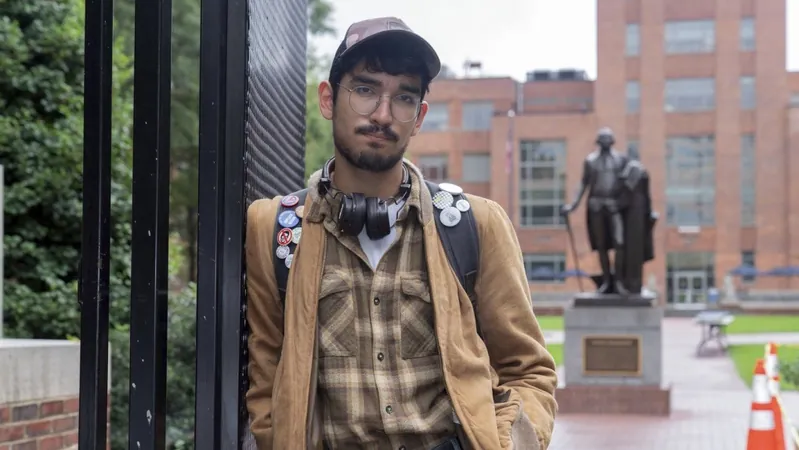
The Israel-Hamas War's Impact on Campus Free Speech: Students Feel the Chill
2024-10-06
A year after the Israel-Hamas conflict escalated with the devastating attacks on October 7, 2023, students across U.S. college campuses report increased anxiety surrounding discussions of related political issues. For Ty Lindia, a political science junior at George Washington University, the ambiance of apprehension underscores interactions with fellow students. “The fear of saying the wrong thing can be paralyzing,” he confides, highlighting how friendships have been strained or severed over differing opinions regarding the war. He notes that while he once felt at ease expressing his views, the atmosphere shifted drastically post-October 7, leading to self-censorship out of concern for future job prospects.
As students grapple with this newfound trepidation, social dynamics continue to fracture. The conflict's repercussions have created palpable divides among peers, professors, and potential employers. Mikayla Kaplan, a sophomore at Indiana University, recently opted against sharing her perspective on the Israeli military during a classroom discussion, citing fears of backlash in a politically charged environment. Like many Jewish students, she now finds herself primarily surrounded by similarly faith-oriented friends, reflecting shifts in social circles resulting from the turmoil.
This ongoing conflict has its roots in the initial Hamas-led attack that claimed approximately 1,200 lives. Following massive retaliatory actions from Israel, the toll has escalated, with the Gaza Health Ministry reporting over 41,000 Palestinian casualties. Amidst the chaos, colleges like the University of Connecticut witness a marked reluctance among students to address the issues in class, likely stemming from fears that personal opinions on such a volatile subject could lead to professional scrutiny.
Historically, university campuses have been hotbeds of political discourse, yet today’s climate appears more fragmented than eras past, such as those surrounding the Vietnam War. Mark Yudof, a former president of the University of California system, emphasizes that ideological rifts now penetrate the fabric of university communities, where students are often cautious of expressing dissenting views.
In response to the tense atmosphere, several institutions are attempting to foster productive dialogue. At Harvard, surveys indicate that both students and faculty are hesitant to voice their opinions. Initiatives aimed at reintroducing civil discourse, including panels featuring speakers from both Palestinian and Jewish backgrounds, have emerged. However, the institution of new regulations surrounding protests has raised alarms. Rules prohibiting late-night demonstrations, for example, have drawn criticism for their potential to stifle grassroots activism.
At the forefront of these changes is the issue of balancing free expression with safety. The U.S. Education Department is currently investigating numerous colleges for reports of antisemitism and Islamophobia, highlighting the complexities universities face in preserving an open dialogue while addressing genuine concerns of discrimination.
As the aftermath of the October attacks continues to influence students’ lives academically and socially, many express frustration over the stymieing of moderate voices. Nivriti Agaram, a junior at George Washington University, is one such student who feels both sides are silenced by extremes. She acknowledges Israel’s right to defend itself but questions U.S. military spending in the conflict, a stance that has drawn harsh criticism from her peers. “It’s stifling,” she admits, suggesting a silent majority exists that refrains from discussing their views amidst the pervasive polarization.
As educational institutions strive for a balance between expressive freedom and the need for inclusivity, the lingering effects of the Israel-Hamas war illuminate the challenges facing today's students, who find discourse increasingly daunting in an era defined by ideological fervor.









 Brasil (PT)
Brasil (PT)
 Canada (EN)
Canada (EN)
 Chile (ES)
Chile (ES)
 España (ES)
España (ES)
 France (FR)
France (FR)
 Hong Kong (EN)
Hong Kong (EN)
 Italia (IT)
Italia (IT)
 日本 (JA)
日本 (JA)
 Magyarország (HU)
Magyarország (HU)
 Norge (NO)
Norge (NO)
 Polska (PL)
Polska (PL)
 Schweiz (DE)
Schweiz (DE)
 Singapore (EN)
Singapore (EN)
 Sverige (SV)
Sverige (SV)
 Suomi (FI)
Suomi (FI)
 Türkiye (TR)
Türkiye (TR)